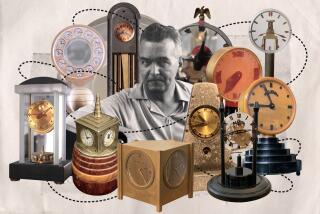Clock Industry in No Danger of Winding Down : Van Nuys Retailer Calls Marketing the Key
Americans always know what time it is. The average household has 5.5 clocks, the industry says, not even counting clocks on appliances, car clocks or wristwatches.
But that doesn’t stop Americans from buying more clocks, and the secret, Anthony Vitale said, is that they buy them for decoration, for conversation, even for fun. They buy them, in other words, because they like them.
Vitale likes them, too. He is president of Ted’s Clock Emporium, a Van Nuys-based chain that is said to be the nation’s largest retailer that sells nothing but clocks. Ted’s sold $6 million worth of clocks in 1985 as a retailer and had another $1 million in revenue acting as a clock wholesaler for manufacturers. It has nine stores, all in Southern California.
Vitale, 54, a native of New York, founded the company 10 years ago with Ted Katz, a former Glendale jeweler who retired last year.
“I was the merchandiser, the salesman,” Vitale said. “He was an expert watch and clock maker.”
The clock business has been good to Vitale and Katz. The business generates an after-tax profit of about 7% on sales, Vitale said, but the Vitale and Katz families, who own it, get more than profits: Counting the president, five members of both clans are on the payroll in management jobs.
Salaries are often better than profits in such cases because profits are taxed twice, once as corporate income, and again as personal income when they’re distributed.
Vitale said Ted’s has done so well because all nine Ted’s stores are in major shopping malls, where customers who never dreamed of buying a $3,000 clock can pass by and see them. Two-thirds of Ted’s revenue comes from sales of grandfather clocks, which cost from $600 to $7,000.
Marketing the Key
At a time when discount stores are thriving, Ted’s is charging full prices.
“We’re the highest guy on the block,” Vitale said about the stores’ prices. “If you’re running around looking for the best buy, I can’t sell you a clock.”
Vitale said marketing is the key. His company advertises constantly, and has worked hard to persuade people that clocks are decorator items worth spending money on.
As a result, Ted’s can charge high prices. Its gross profit margin is 40% on big, free-standing clocks and 50% on smaller timepieces, versus an industry average of about 35% on both, Vitale said.
Rather than price, Ted’s stresses selection and service. It makes house calls to fix or move clocks, and gives a three-year warranty on its imposing grandfather models. It even has a toll-free number for clock owners who need help.
Before Ted’s, Vitale said, clock marketing was behind the times: “We took it out of the Stone Age.”
The clock industry is still lagging in some ways.
“We have an industry that sells close to $750 million at retail in which no one has any facts and figures,” complained Anthony J. Rodriguez, general manager of Bulova’s clock division and president of the newly formed Clock Manufacturers and Marketing Assn.
Added Jayne Barrick, managing editor of a monthly trade journal, Watch & Clock Review: “It’s a very small industry, relatively speaking.”
Visual Appeal
Rodriguez said one thing that is known about the business is that people don’t buy clocks to tell time.
“You’re buying the artistry, the craftsmanship,” he said. “If it happens to tell time, fine.”
One of the chief fascinations grandfather clocks hold for modern buyers appears to be that the clocks are old-fashioned. All Vitale’s grandfather clocks are entirely mechanical, running on weights and requiring weekly winding with an ornate key. The chimes are real, and if you don’t like the noise you can turn it off before bed.
“No high-tech here,” Vitale said. “If I told them it was computerized, they would run out of the store.”
That doesn’t mean the world of clocks is timeless, of course. Other retailers are selling grandfather clocks with microprocessors instead of mechanical chimes. They emit noises electronically that are said to be indistinguishable from conventional chimes, and they can be programmed to keep quiet at night.
‘Godfather’ of Clock Industry
Ted’s is not the only store that sells nothing but clocks, but it appears to do the biggest dollar volume. Many clocks are sold by department stores, and there are other large clock retailers in the country, but most of those have only one or two stores, Rodriguez said.
“Ted’s is the largest clock dealer in the country,” said John Wampler, regional sales manager for Pulaski Furniture, whose Ridgeway clock division claims to make a quarter of the grandfather clocks sold nationally. Vitale, he said, “is the godfather of the clock industry.”
Wampler said Ted’s is a major customer for Ridgeway, whose studies indicate that 4% of American households have a grandfather clock.
Ted’s, which has 65 employees, plans to expand. Vitale said he hopes to open two more stores in Orange County and wants to have at least one store in San Diego by the end of 1987.
Ted’s has stores in Glendale, Northridge, Arcadia, Torrance, Cerritos, Thousand Oaks, Brea, Westminster and Montclair.
The Northridge store does the biggest volume, Vitale said. A 10th store, in Santa Monica, was closed because it didn’t do well, he said.
More to Read
Inside the business of entertainment
The Wide Shot brings you news, analysis and insights on everything from streaming wars to production — and what it all means for the future.
You may occasionally receive promotional content from the Los Angeles Times.










